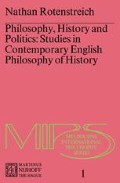Abstract
In the previous pages the connection between politics and history has been brought into relief from different points of view. The difference corresponds to the difference in focus which characterizes the respective system explored. The very term “history” — as we have seen — is used to denote a variety of meanings. In the course of Collingwood’s development, the term was made to carry several different connotations; in Isaiah Berlin the term denotes the process in time and its rhythm.
Access this chapter
Tax calculation will be finalised at checkout
Purchases are for personal use only
Preview
Unable to display preview. Download preview PDF.
References
Experience and its Modes, Cambridge, 1933, p. 118.
Ibid., p. 106.
Ibid., p. 105.
“The Activity of Being an Historian”, in Rationalism in Politics and other Essays, London, 1962, p. 154.
Ibid., p. 150.
Ibid.
See ibid., p. 164.
Experience and its Modes, p. 25.
Ibid., p. 273.
Cf. ibid., p. 258.
Ibid., p. 103.
“The Activity of Being an Historian”, ibid., p. 147.
Experience and its Modes, p. 103.
“The Activity of Being an Historian”, in Rationalism in Politics, pp. 153–154.
“The Study of ‘Polities’ in a University”, ibid., p. 327.
“Political Education”, ibid., p. 112.
“On Being Conservative”, ibid., p. 184.
Ibid., p. 187.
Cf. ibid., p. 189.
Ibid., p. 188.
“The Political Economy of Freedom”, ibid., p. 58.
“Political Education”, ibid., p. 113.
Review of J. D. Mabboth’s “The State and the Citizen”, Mind, Vol. LVIII/231, 1949, P-389.
“Rationalism in Politics”, ibid., p. 11.
“Political Education”, ibid., p. 125.
“On Being Conservative”, ibid., p. 194.
Ibid., p. 172.
Ibid., p. 169.
Ibid., p. 172.
Experience and its Modes, p. 354.
Ibid., p. 355. It is not out of place to mention here the characteristic reservation against utopianism present in a previous stage of English philosophy and indeed in a trend different from that represented by M. Oakeshott. We refer here to J. S. Mill — and indeed to Bentham as well. Mill says that he did not think the Utopian doctrines — Owenite, St. Simonian — to be true or desire that they should be acted on. Mill wanted that the higher classes “might be made to see that they had more to fear from the poor when uneducated, than when educated” (J. S. Mill, Autobiography, Oxford, 1935, p. 146). Utopias are to be eye-openers.
“Contemporary British Politics”, The Cambridge Journal, Vol. 1/8,1947–1948, p. 476.
See the “Introduction” to The Social and Political Doctrines of Contemporary Europe, Cambridge and New York, 1942, p. XIII.
“The Universities”, The Cambridge Journal, Vol. II/9, 1948–1949, p. 528.
“The Tower of Babel”, Rationalism in Politics, p. 66.
Ibid., p. 79.
“The Universities”, p. 524.
“Introduction” to The Social and Political Doctrines of Contemporary Europe, p. XXIII, note.
“Science and Society”, The Cambridge Journal, Vol. I/II, 1947–1948, p. 691.
Cf. p. XII of his edition of Hobbes’ Leviathan, Oxford, 1946.
Following Professor Oakeshott’s terminology, A. P. d’Entrèves refers to Hobbes as a ‘rationalist’. See Natural Law: An Introduction to Legal Philosophy, London, 1951.
“The Political Economy of Freedom”, Rationalism in Polities, p. 40.
“Introduction” to The Social and Political Doctrines of Contemporary Europe, p.XXII.
Ibid.
Rights and permissions
Copyright information
© 1976 Martinus Nijhoff, The Hague, Netherlands
About this chapter
Cite this chapter
Rotenstreich, N. (1976). History, Tradition and Politics: Michael Oakeshott. In: Philosophy, History and Politics. Melbourne International Philosophy Series, vol 1. Springer, Dordrecht. https://doi.org/10.1007/978-94-010-1351-2_3
Download citation
DOI: https://doi.org/10.1007/978-94-010-1351-2_3
Publisher Name: Springer, Dordrecht
Print ISBN: 978-90-247-1743-9
Online ISBN: 978-94-010-1351-2
eBook Packages: Springer Book Archive

